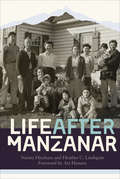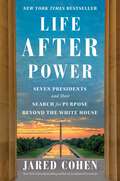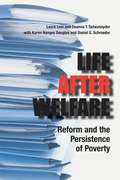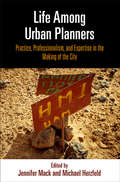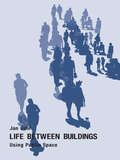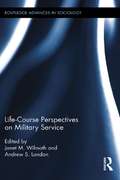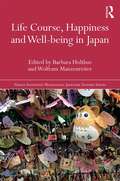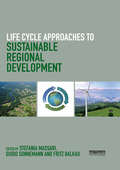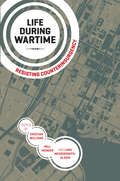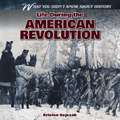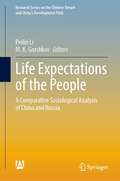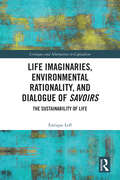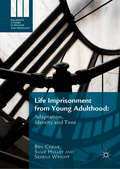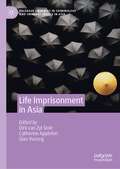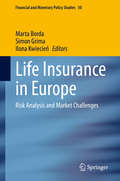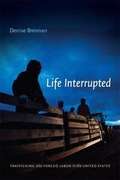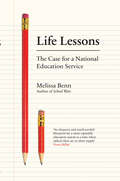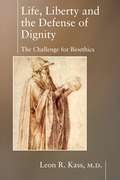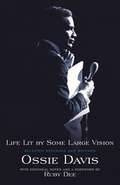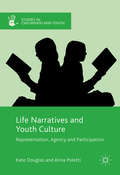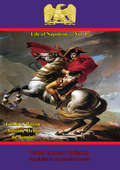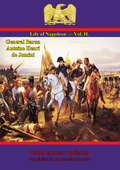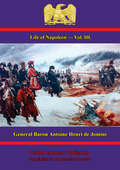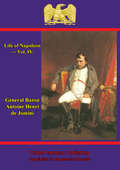- Table View
- List View
Life After Manzanar
by Naomi Hirahara Heather C. Lindquist&“A compelling account of the lives of Japanese and Japanese Americans incarcerated during World War II . . . instructive and moving.&”—Nippon.com From the editor of the award-winning Children of Manzanar, Heather C. Lindquist, and Edgar Award winner Naomi Hirahara comes a nuanced account of the &“Resettlement&”: the relatively unexamined period when ordinary people of Japanese ancestry, having been unjustly imprisoned during World War II, were finally released from custody. Given twenty-five dollars and a one-way bus ticket to make a new life, some ventured east to Denver and Chicago to start over, while others returned to Southern California only to face discrimination and an alarming scarcity of housing and jobs. Hirahara and Lindquist weave new and archival oral histories into an engaging narrative that illuminates the lives of former internees in the postwar era, both in struggle and unlikely triumph. Readers will appreciate the painstaking efforts that rebuilding required and will feel inspired by the activism that led to redress and restitution—and that built a community that even now speaks out against other racist agendas. &“Through this thoughtful story, we see how the harsh realities of the incarceration experience follow real lives, and how Manzanar will sway generations to come. When you finish the last chapter you will demand to read more.&”—Gary Mayeda, national president of the Japanese American Citizens League &“An engaging, well-written telling of how former Manzanar detainees played key roles in remembering and righting the wrong of the World War II incarceration.&”—Tom Ikeda, executive director of Densho
Life After Power: Seven Presidents and Their Search for Purpose Beyond the White House
by Jared CohenThis &“informative…highly readable&” (The Wall Street Journal) New York Times bestselling book from the author of the bestseller Accidental Presidents explores what happens after the most powerful job in the world: President of the United States.Former presidents have an unusual place in American life. King George III believed that George Washington&’s departure after two terms made him &“the greatest character of the age.&” But Alexander Hamilton worried former presidents might &“[wander] among the people like ghosts.&” They were both right. Life After Power tells the stories of seven former presidents, from the Founding to today. Each changed history. Each offered lessons about how to decide what to do in the next chapter of life. This book follows the exceptional lives of past presidents including: -Thomas Jefferson whose time after the White House saw him shaping public debates and founding the University of Virginia, an accomplishment he included on his tombstone, unlike his presidency. -John Quincy Adams who served in Congress and became a leading abolitionist, passing the torch to Abraham Lincoln. -Grover Cleveland who was the only president in American history to serve a nonconsecutive term. -William Howard Taft who became Chief Justice of the Supreme Court. -Herbert Hoover who shaped the modern conservative movement, led relief efforts after World War II, reorganized the executive branch, and reconciled John F. Kennedy and Richard Nixon. -Jimmy Carter who had the longest post-presidency in American history, advancing humanitarian causes, human rights, and peace. -George W. Bush who made a clean break from politics, bringing back George Washington&’s precedent, and reminding the public that the institution of presidency is bigger than any person. Jared Cohen explores the untold stories in the final chapters of these presidents&’ lives, offering a &“unique and fascinating look at how seven individuals made the transition from the most powerful position in the world to consequential and fulfilling lives post-presidency&” (Condoleezza Rice, 66th Secretary of State). He tells how they handled very human problems of ego, finances, and questions about their legacy and mortality. He shows how these men made history after they left the White House.
Life After Welfare
by Laura Lein Deanna T. SchexnayderIn the decade since President Clinton signed the Personal Responsibility and Work Opportunity Reconciliation Act of 1996 into law--amidst promises that it would "end welfare as we know it"--have the reforms ending entitlements and moving toward time limits and work requirements lifted Texas families once living on welfare out of poverty, or merely stricken their names from the administrative rolls?Under welfare reform, Texas has continued with low monthly payments and demanding eligibility criteria. Many families who could receive welfare in other states do not qualify in Texas, and virtually any part-time job makes a family ineligible. In Texas, most families who leave welfare remain in or near poverty, and many are likely to return to the welfare rolls in the future. This compelling work, which follows 179 families after leaving welfare, is set against a backdrop of multiple types of data and econometric modeling. The authors' multi-method approach draws on administrative data from nine programs serving low-income families and a statewide survey of families who have left welfare. Survey data on health problems, transportation needs, and child-care issues shed light on the patterns of employment and welfare use seen in the administrative data. In their lives after welfare, the families chronicled here experience poverty even when employed; a multiplicity of barriers to employment that work to exacerbate one another; and a failing safety net of basic human services as they attempt to sustain low-wage employment.
Life Among Urban Planners: Practice, Professionalism, and Expertise in the Making of the City (The City in the Twenty-First Century)
by Michael Herzfeld Jennifer MackA collection of ethnographic case studies of urban planners and their practicesUrban planners project the future of cities. As experts, they draft visions of places and times that do not yet exist, prescribing the tools to be used to achieve those visions. Their choices can determine how a city will merge its public transit and automobile traffic or how it will meet a demand for thousands of new dwelling units as quickly and with as little avoidable damage as possible. Life Among Urban Planners considers planning professionals in relation to the social contexts in which they operate: the planning office, the construction site, and even in the confrontations with thos eaffected by their work. What roles do planners have in shaping the daily practices of urban life? How do they employ, manipulate, and alter their expertise to meet the demands asked of them? The essays in this volume emphasize planners' cultural values and personal assumptions and critically examine what their persistent commitment to thinking about the future means for the ways in which people live in the present and preserve the past.Life Among Urban Planners explores the practices and politics of professional city-making in a wide selection of geographical areas spanning five continents. Cases include but are not limited to Bangkok, Bogotá, Chicago, Naimey, Rome, Siem Reap, Stockholm, and Warsaw. Examining the issues raised around questions of expertise, participation, and the tension between market and state forces, contributors demonstrate how certain planning practices accentuate their specific relationship to a place while others are represented to a global audience as potentially universal solutions. In presenting detailed and intimate portraits of the everyday lives of planners, the volume offers key insights into how the city interacts with the world.Contributors: Margaret Crawford, Adèle Esposito, Trevor Goldsmith, Mark Graham, Michael Herzfeld, James Holston, Gabriella Körling, Jennifer Mack, Andrew Newman, Lissa Nordin, Bruce O'Neill, Kevin Lewis O'Neill, Federico Pérez, Monika Sznel.
Life Between Buildings: Using Public Space
by Jan Gehl". . .thoughtful, beautiful, and enlightening..." --Jane Jacobs "This book will have a lasting infl uence on the future quality of public open spaces. By helping us better understand the larger public life of cities, Life between Buildings can only move us toward more lively and healthy public places. Buy this book, fi nd a comfortable place to sit in a public park or plaza, begin reading, look around. You will be surprised at how you will start to see (and design) the world differently." --Landscape Architecture
Life Course Perspectives on Military Service: Life Course Perspectives On Military Service (Routledge Advances in Sociology #83)
by Janet M. Wilmoth Andrew S. LondonThis edited volume provides a comprehensive and critical review of what we know about military service and the life course, what we don’t know, and what we need to do to better understand the role of military service in shaping people's lives. It demonstrates that the military, like colleges and prisons, is a key social institution that engages individuals in early adulthood and shapes processes of cumulative (dis)advantage over the life course. The chapters provide topical synthesizes of the vast but diffuse research literatures on military service and the life course, while the volume as a whole helps to set the agenda for the next generation of data collection and scholarship. Chapter authors pay particular attention to how the military has changed over time; how experiences of military service vary across cohorts and persons with different characteristics; how military service affects the lives of service members’ spouses, children, and families; and the linkages between research and policy.
Life Course, Happiness and Well-being in Japan
by Barbara Holthus Wolfram ManzenreiterMuch of the existing literature on happiness in Japan has been produced in the field of economics and psychology and is quantitative in nature. Here, for the first time, a group of anthropologists and sociologists jointly analyze the state of happiness and unhappiness in Japan among varying social groups in its physical, interpersonal, existential and structural dimensions, offering new insights into fundamental issues. This book investigates the connections between sociostructural aspects, individual agency and happiness in contemporary Japan from a life course perspective. The contributors examine quantitative and qualitative empirical data on the processes that impact how happiness and well-being are envisioned, crafted, and debated in Japan across the life-cycle. Therefore, the book discusses the shifting notions of happiness during people’s lives from birth to death, analyzing the age group-specific experiences while taking into consideration people’s life trajectories and historical changes. It points out recent developments in regards to demographic change, late marriage, and the changing labor market and focuses on their significant impact on the well-being of Japanese people. In particular it highlights the interdependencies of lives within the family and how families are collaborating for the purpose of maintaining or enhancing the happiness of its members. Broadening our understanding of the multidimensionality of happiness in Japan, this book will be of interest to students and scholars of Japanese Studies, Anthropology, and Sociology.
Life Cycle Approaches to Sustainable Regional Development
by Guido Sonnemann Stefania Massari Fritz BalkauLife Cycle Approaches to Sustainable Regional Development explains the ways life cycle methodologies and tools can be used to strengthen regional socio-economic planning and development in a more sustainable manner. The book advocates the adoption of systematic and long-term criteria for development decision-making, taking into account the full life cycle of materials and projects. It describes life cycle practices from both a scientific and a practitioner point of view, highlighting examples and case studies at regional level. The applications are relevant to key economic sectors, as well as for internal planning and administrative procedures. It concludes with a synthesis chapter that distills the key messages from the authors into practical guidance points on how best to use such approaches to enhance sustainability in regional development. The book is essential reading for regional and urban planners who are integrating life cycle thinking into their policy regimes, as well as for researchers working to further evolve life cycle methodologies.
Life During Wartime
by Kristian Williams William Munger Lara Messersmith-Glavin"Together, the writers sound a sobering warning: the American government is an iron fist in a velvet glove whose purpose remains preserving the status quo and enriching the rich."- Publishers WeeklyWhat happens when the techniques of counterinsurgency, developed to squash small skirmishes and guerrilla wars on the border of Empire, blend into the state's apparatus for domestic policing? In Life During Wartime, fifteen authors and activists reflect on the American domestic security apparatus, detailing the increasing militarization of the police force and the re-emergence of infiltration and counter-intelligence as surveillance strategies, highlighting the ways that the techniques and the technologies of counterinsurgency have been applied on the home front, and offering strategies for resistance.Includes contributions Kristian Williams, Will Munger, Walidah Imarisha, George Ciccariello-Maher, Beriah Empie, Elaine Brown, Geoffrey Boyce, Conor Cash, Vicente L. Rafael, Alexander Reid Ross, Evan Tucker, Layne Mullett, Sarah Small, and Luce Guillen-Givins.
Life During Wartime
by Kristian Williams William Munger Lara Messersmith-Glavin"Together, the writers sound a sobering warning: the American government is an iron fist in a velvet glove whose purpose remains preserving the status quo and enriching the rich."- Publishers WeeklyWhat happens when the techniques of counterinsurgency, developed to squash small skirmishes and guerrilla wars on the border of Empire, blend into the state's apparatus for domestic policing? In Life During Wartime, fifteen authors and activists reflect on the American domestic security apparatus, detailing the increasing militarization of the police force and the re-emergence of infiltration and counter-intelligence as surveillance strategies, highlighting the ways that the techniques and the technologies of counterinsurgency have been applied on the home front, and offering strategies for resistance.Includes contributions Kristian Williams, Will Munger, Walidah Imarisha, George Ciccariello-Maher, Beriah Empie, Elaine Brown, Geoffrey Boyce, Conor Cash, Vicente L. Rafael, Alexander Reid Ross, Evan Tucker, Layne Mullett, Sarah Small, and Luce Guillen-Givins.
Life During the American Revolution (What You Didn't Know About History)
by Kristen RajczakThe American Revolution was full of odd events not usually included in history books. Some of these events include: the tar and feathering of British supporters and battles taking place in farmers fields. Readers will find many new and sometimes funny facts in this book, such as patriot soldiers leaving the war to harvest their crops. Surprising fact boxes and distinctive historical information engage readers with a unique look at the Revolutionary War.
Life Expectations of the People: A Comparative Sociological Analysis of China and Russia (Research Series on the Chinese Dream and China’s Development Path)
by Peilin Li M. K. GorshkovThis book compares the Chinese and Russian dreams, focusing on eight aspects: prosperity, affluence, family harmony, fairness and justice, diversity, green beauty, honesty and uprightness, and happiness. Based on large-scale survey data combined with the corresponding sociological theory for analysis, it presents detailed information, compelling arguments, and well-founded conclusions, offering insights into the commonalities and differences between these two countries' dreams.
Life Imaginaries, Environmental Rationality, and Dialogue of Savoirs: The Sustainability of Life (Critiques and Alternatives to Capitalism)
by Enrique LeffShifting from the idea that our current ‘environmental question’ arises from the history of metaphysics and its focus on ‘Being’ over ‘Life’—and the attendant explorations of the thought of Heidegger and Heraclitus—this book unfolds a philosophical and sociological proposal for transitioning toward the sustainability of life.With a focus on the imaginaries of life of indigenous peoples, it moves from political ecology to a political ontology, centered on the territorial, cultural, and existential rights of various peoples of the Earth. Arguing for an environmental rationality founded on three principles—the diversity of life, a politics of difference, and an ethics of otherness—it calls for a dialogue of knowledge in a world of manifold worlds, for an historical transition toward sustainability of life on our planet.It will therefore appeal to scholars of sociology, philosophy, and political theory working on questions of social and environmental justice, sustainability, and alternatives to capitalism.
Life Imprisonment from Young Adulthood: Adaptation, Identity and Time (Palgrave Studies in Prisons and Penology)
by Ben Crewe Susie Hulley Serena WrightThis book analyses the experiences of prisoners in England & Wales sentenced when relatively young to very long life sentences (with minimum terms of fifteen years or more). Based on a major study, including almost 150 interviews with men and women at various sentence stages and over 300 surveys, it explores the ways in which long-term prisoners respond to their convictions, adapt to the various challenges that they encounter and re-construct their lives within and beyond the prison. Focussing on such matters as personal identity, relationships with family and friends, and the management of time, the book argues that long-term imprisonment entails a profound confrontation with the self. It provides detailed insight into how such prisoners deal with the everyday burdens of their situation, feelings of injustice, anger and shame, and the need to find some sense of hope, control and meaning in their lives. In doing so, it exposes the nature and consequences of the life-changing terms of imprisonment that have become increasingly common in recent years.
Life Imprisonment in Asia (Palgrave Advances in Criminology and Criminal Justice in Asia)
by Catherine Appleton Dirk van Zyl Smit Giao VucongLife imprisonment is the punishment most often imposed worldwide for what societies regard as the most serious offences. Yet, in Asia the phenomenon has never been studied systematically. Life Imprisonment in Asia fills this major gap. It brings together thirteen new essays on life imprisonment in key jurisdictions in the region. Each chapter consolidates what is known about the law and practice of life imprisonment in the jurisdiction and then explores aspects of the imposition or implementation of life sentences that the authors regard as particularly problematic. In some instances, the main issue is the imposition of life sentences by the courts and their relationship to the death penalty. In others, the focus is on the treatment of life sentenced prisoners. In many instances, the most prominent question is whether life sentenced prisoners should be released and, if so, according to what processes. In the overview chapter, the editors place the complex picture that emerges of life imprisonment in Asia in a global context and point to reforms urgently required to ensure that Asian life sentences meet international human rights standards.Life Imprisonment in Asia should be read by everyone who has an interest in just punishments for serious offences, not only in Asia, but throughout the world. It will be an invaluable tool for lawyers, criminologists, policy makers and penal reform advocates in the region and beyond.
Life Insurance in Europe: Risk Analysis and Market Challenges (Financial and Monetary Policy Studies #50)
by Simon Grima Marta Borda Ilona KwiecieńThis book examines the challenges for the life insurance sector in Europe arising from new technologies, socio-cultural and demographic trends, and the financial crisis. It presents theoretical and applied research in all areas related to life insurance products and markets, and explores future determinants of the insurance industry’s development by highlighting novel solutions in insurance supervision and trends in consumer protection. Drawing on their academic and practical expertise, the contributors identify problems relating to risk analysis and evaluation, demographic challenges, consumer protection, product distribution, mortality risk modeling, applications of life insurance in contemporary pension systems, financial stability and solvency of life insurers. They also examine the impact of population aging on life insurance markets and the role of digitalization. Lastly, based on an analysis of early experiences with the implementation of the Solvency II system, the book provides policy recommendations for the development of life insurance in Europe.
Life Interrupted: Trafficking into Forced Labor in the United States
by Denise BrennanLife Interrupted introduces us to survivors of human trafficking who are struggling to get by and make homes for themselves in the United States. Having spent nearly a decade following the lives of formerly trafficked men and women, Denise Brennan recounts in close detail their flight from their abusers and their courageous efforts to rebuild their lives. At once scholarly and accessible, her book links these firsthand accounts to global economic inequities and under-regulated and unprotected workplaces that routinely exploit migrant laborers in the United States. Brennan contends that today's punitive immigration policies undermine efforts to fight trafficking. While many believe trafficking happens only in the sex trade, Brennan shows that across low-wage labor sectors--in fields, in factories, and on construction sites--widespread exploitation can lead to and conceal forced labor. Life Interrupted is a riveting account of life in and after trafficking and a forceful call for meaningful immigration and labor reform.All royalties from this book will be donated to the nonprofit Survivor Leadership Training Fund administered through the Freedom Network.
Life Lessons: The Case for a National Education Service
by Melissa BennA radical agenda to make our education system fit for the twenty-first centuryOur education system has been damaged by politicians who have arrogantly imposed a regime of market-driven reforms. It is time to reframe education as an essential public good, one arising from a hunger to find more engaging ways to learn and the powerful imperative to make our society genuinely equal.In this timely and provocative essay, Melissa Benn argues for a National Education Service. Like the NHS, the NES would provide the framework for a life-long entitlement to education: from early-years provision to apprenticeships, universities and adult education. It should be free at the point of delivery. It should nurture teachers and scholarship, moving beyond an obsession with exam results to create fully rounded, questioning citizens. Its eventual aim should be an integrated, comprehensive system available to all.
Life Liberty & the Defense of Dignity
by Leon KassAt the onset of Life, Liberty and the Defense of Dignity, Leon Kass gives us a status report on where we stand today: "Human nature itself lies on the operating table, ready for alteration, for eugenic and psychic 'enhancement,' for wholesale redesign. In leading laboratories, academic and industrial, new creators are confidently amassing their powers and quietly honing their skills. For anyone who cares about preserving our humanity, the time has come for paying attention." Trained as a medical doctor and biochemist, Dr. Kass has become one of our most provocative thinkers on bioethical issues. In Life, Liberty and the Defense of Dignity, he has written a book that grapples with the moral meaning of the new biomedical technologies now threatening to take us back to the future envisioned by Aldous Huxley in Brave New World. In a series of mediations on cloning, embryo research, the sale of organs, and the assault on mortality itself, Kass questions the wisdom of trying to break down the natural boundaries given us and to remake the human body into an instrument of our will. He also attempts to chart a course by which we might avoid the dehumanization of biotechnical "recreationism" without rejecting modern science or rejecting its genuine contributions to human welfare. Leon Kass writes profoundly about the limits of science and the limits of life, about what makes us human and gives us human dignity. Life, Liberty and the Defense of Dignity.
Life Lit by Some Large Vision
by Ruby Dee Ossie DavisOssie Davis, the celebrated civil rights activist, actor, writer, and director, is remembered for a film, television, and stage career of more than half a century. His awards include an Emmy Award, an NAACP Image Award for his work in the Spike Lee film Do the Right Thing, a Lifetime Achievement Award from the Screen Actors Guild, and a Kennedy Center Honor. The last two honors, like so many of his accomplishments, were shared with his wife and partner (in life and in work), Ruby Dee. Ossie Davis is also revered for his lifelong commitment to those social and political causes about which he was so passionate. Of all the gifts he possessed, perhaps none was greater than his ability to articulate the important issues of the day. He used his brilliant mind and his oratory skills to give voice to his concerns as a black man, an American, and a human being in the world, as well as to the individuals and communities whose concerns he made his own. This monumental book brings together many of the moving speeches, essays, and other writings as an ultimate gift to posterity. Life Lit by Some Large Vision includes some humor, some history, and some surprises: moving tributes to such luminaries as Malcolm X and Louis Armstrong; thought-provoking speeches on the treachery of the English language and the challenge of breaking through the "niggerization" process; letters to friends and fellow thinkers; essays that span decades of social thought and revolutionary positions; and the closing monologue from his groundbreaking 1961 play, Purlie Victorious. The unforgettable sound of Ossie Davis's voice is well documented in his work on film and television, but the words on these pages offer his heart and mind, and will be the next best thing to witnessing him speak in person. Ruby Dee contributes a foreword to the collection and introductory notes to the individual pieces, many of which were written and delivered with her at his side. The result is a comprehensive celebration of one man's extraordinary wisdom and generosity. This is a book that will enrich countless readers -- as a gift, an educational resource, a volume to be read aloud on special occasions, and much more.
Life Narratives and Youth Culture: Representation, Agency and Participation (Studies in Childhood and Youth)
by Kate Douglas Anna Poletti<P>This book considers the largely under-recognised contribution that young writers have made to life writing genres such as memoir, letter writing and diaries, as well as their innovative use of independent and social media. The authors argue that these contributions have been historically silenced, subsumed within other literary genres, culturally marginalised or co-opted for political ends. Furthermore, the book considers how life narrative is an important means for youth agency and cultural participation. <P><P>By engaging in private and public modes of self-representation, young people have contested public discourses around the representation of youth, including media, health and welfare, and legal discourses, and found means for re-engaging and re-appropriating self-images and representations. <P>Locating their research within broader theoretical debates from childhood and youth studies: youth creative practice and associated cultural implications; youth citizenship and autonomy; the rights of the child; generations and power relationships, Poletti and Douglas also position their inquiry within life narrative scholarship and wider discussions of self-representation from the margins, representations of conflict and trauma, and theories of ethical scholarship.
Life Of Napoleon — Vol. I. (Life Of Napoleon #1)
by General Baron Antoine Henri de Jomini General H. W. HalleckThe life of Napoleon is etched still across the history of Europe, in the wars he waged, the dynasties that he toppled, and the laws he enacted. Even in an epoch rich in social change, from the bottom up he remains a fascinating figure; biographers face the challenge of doing justice to such a multi-faceted character. Few can have been said to have access to the Emperor as much as the generals that served under him throughout his many campaigns; General Jomini spent many year serving the Emperor and many more in the company of some of his enemies putting him in an excellent position to write his biography. Written as if by Napoleon himself, Jomini traces Napoleon's political and military successes and failures, weaving them into a seamless narrative that makes his work one of the few rounded biographies of Napoleon.This first volume covers Napoleon's early years from birth in Ajaccio in Corsica to his ascent to the Consulship and the peace of Amiens in 1802.Of the Author -- General Jomini saw much service during the Napoleonic Wars, initially working in staff positions for Marshal Ney prior to being attached to the Emperor's own headquarters during the 1806 and 1807 campaigns. He was pushed out of the Grande Armée into the arms of the Russian service in 1813, becoming aide-de-camp to the Tzar. He was famous for his copious output of works on the military theory and strategy employed during the French Revolution, the Napoleonic Wars, and even those of Frederick the Great. He is often remembered for his chef d'œuvre, the "Art of War", and has been dubbed the "founder of modern strategy" by historian John Shy.Author -- General Baron Antoine Henri de Jomini (1779-1869)Translator -- General H. W. Halleck (1815-1872
Life Of Napoleon — Vol. II. (Life Of Napoleon #2)
by General Baron Antoine Henri de Jomini General H. W. HalleckThe life of Napoleon is etched still across the history of Europe, in the wars he waged, the dynasties that he toppled, and the laws he enacted. Even in an epoch rich in social change, from the bottom up he remains a fascinating figure; biographers face the challenge of doing justice to such a multi-faceted character. Few can have been said to have access to the Emperor as much as the generals that served under him throughout his many campaigns; General Jomini spent many year serving the Emperor and many more in the company of some of his enemies putting him in an excellent position to write his biography. Written as if by Napoleon himself, Jomini traces Napoleon's political and military successes and failures, weaving them into a seamless narrative that makes his work one of the few rounded biographies of Napoleon.This second volume covers the campaigns of Austerlitz, Jena, Eylau and Friedland and the beginnings of the Peninsular War.Of the Author -- General Jomini saw much service during the Napoleonic Wars, initially working in staff positions for Marshal Ney prior to being attached to the Emperor's own headquarters during the 1806 and 1807 campaigns. He was pushed out of the Grande Armée into the arms of the Russian service in 1813, becoming aide-de-camp to the Tzar. He was famous for his copious output of works on the military theory and strategy employed during the French Revolution, the Napoleonic Wars, and even those of Frederick the Great. He is often remembered for his chef d'œuvre, the "Art of War", and has been dubbed the "founder of modern strategy" by historian John Shy.Author -- General Baron Antoine Henri de Jomini (1779-1869)Translator -- General H. W. Halleck (1815-1872)
Life Of Napoleon — Vol. III. (Life Of Napoleon #3)
by General Baron Antoine Henri de Jomini General H. W. HalleckThe life of Napoleon is etched still across the history of Europe, in the wars he waged, the dynasties that he toppled, and the laws he enacted. Even in an epoch rich in social change, from the bottom up he remains a fascinating figure; biographers face the challenge of doing justice to such a multi-faceted character. Few can have been said to have access to the Emperor as much as the generals that served under him throughout his many campaigns; General Jomini spent many year serving the Emperor and many more in the company of some of his enemies putting him in an excellent position to write his biography. Written as if by Napoleon himself, Jomini traces Napoleon's political and military successes and failures, weaving them into a seamless narrative that makes his work one of the few rounded biographies of Napoleon.This third volume covers the campaigns of Wagram, the continuing Spanish Ulcer and the beginnings of the Russian campaign in 1812.Of the Author -- General Jomini saw much service during the Napoleonic Wars, initially working in staff positions for Marshal Ney prior to being attached to the Emperor's own headquarters during the 1806 and 1807 campaigns. He was pushed out of the Grande Armée into the arms of the Russian service in 1813, becoming aide-de-camp to the Tzar. He was famous for his copious output of works on the military theory and strategy employed during the French Revolution, the Napoleonic Wars, and even those of Frederick the Great. He is often remembered for his chef d'œuvre, the "Art of War", and has been dubbed the "founder of modern strategy" by historian John Shy.Author -- General Baron Antoine Henri de Jomini (1779-1869)Translator -- General H. W. Halleck (1815-1872)
Life Of Napoleon — Vol. IV. (Life Of Napoleon #4)
by General Baron Antoine Henri de Jomini General H. W. HalleckThe life of Napoleon is etched still across the history of Europe, in the wars he waged, the dynasties that he toppled, and the laws he enacted. Even in an epoch rich in social change, from the bottom up he remains a fascinating figure; biographers face the challenge of doing justice to such a multi-faceted character. Few can have been said to have access to the Emperor as much as the generals that served under him throughout his many campaigns; General Jomini spent many year serving the Emperor and many more in the company of some of his enemies putting him in an excellent position to write his biography. Written as if by Napoleon himself, Jomini traces Napoleon's political and military successes and failures, weaving them into a seamless narrative that makes his work one of the few rounded biographies of Napoleon.This fourth volume covers the disastrous effects of the Russian campaign, the fight in Germany of 1813, his downfall in 1814 and his final defeat at Waterloo.Of the Author -- General Jomini saw much service during the Napoleonic Wars, initially working in staff positions for Marshal Ney prior to being attached to the Emperor's own headquarters during the 1806 and 1807 campaigns. He was pushed out of the Grande Armée into the arms of the Russian service in 1813, becoming aide-de-camp to the Tzar. He was famous for his copious output of works on the military theory and strategy employed during the French Revolution, the Napoleonic Wars, and even those of Frederick the Great. He is often remembered for his chef d'œuvre, the "Art of War", and has been dubbed the "founder of modern strategy" by historian John Shy.Author -- General Baron Antoine Henri de Jomini (1779-1869)Translator -- General H. W. Halleck (1815-1872)
